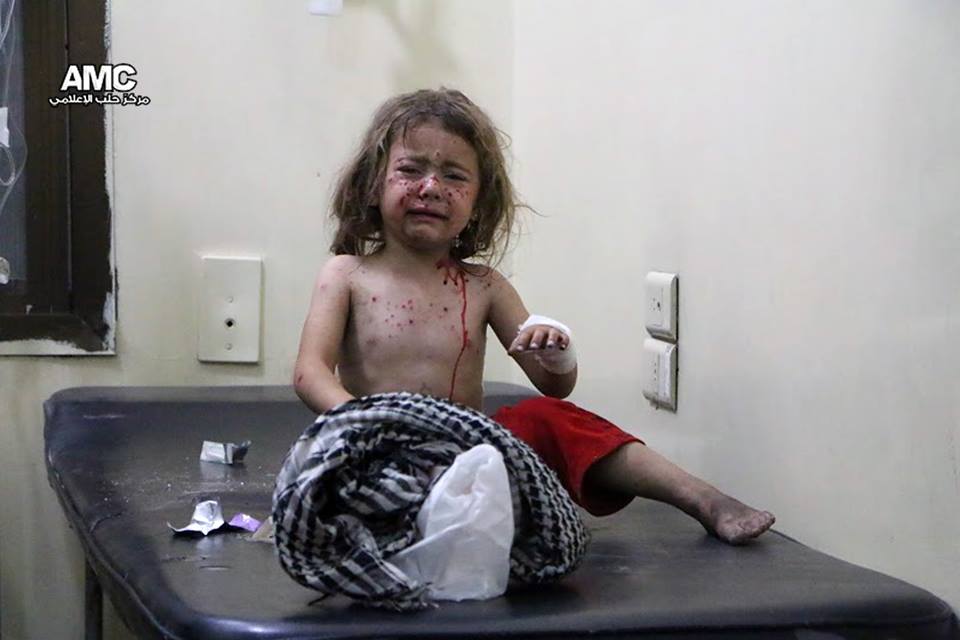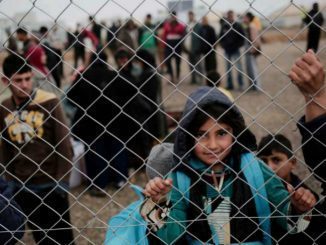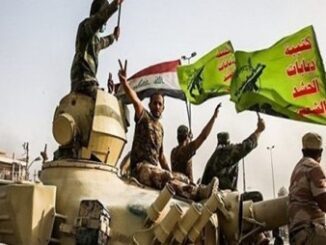Bashar al-Assad has approved that Iraqi jets attack ISIS militants across the Syrian border after the request was made by the Iraqi PM last month, a lawmaker from said on Friday.
At the height of its power two years ago, Islamic State ruled over millions of people in territory running from northern Syria through towns and villages along the Tigris and Euphrates river valleys to the outskirts of Baghdad in Iraq.
It was the mosque of Mosul where al-Baghdadi declared his Caliphate and named himself as the ruler of all Muslims from Mosul’s Great Mosque after his forces swept through northern Iraq in 2014.
However, ISIS’s territory is shrinking rapidly since last year as the US-led coalition, the Turkish-backed forces, and the Russian-backed Assad regime forces have fierce fights against its forces in both Syria and Iraq.
The United States is providing air and ground support to Iraqi and Kurdish forces trying to dislodge the hardline group from Mosul.
Iraqi forces captured the eastern side of Mosul in January after 100 days of fighting and launched their attack on the districts that lie west of the Tigris river on Feb. 19.
Islamic State militants who retreated across the Tigris river to western districts also regularly target civilian areas under government control in the east with mortars and grenades dropped from drones.
Several thousand militants, including many who traveled from Western countries to join up, are believed to be in Mosul among a remaining civilian population estimated at the start of the offensive at 750,000.
They are using mortars, sniper fire, booby traps, and suicide car bombs to fight the offensive carried out by a 100,000-strong force made up of Iraqi armed forces, regional Kurdish peshmerga fighters, and Iranian-trained Shi’ite paramilitary groups.
In addition, ISIS has been conducting suicide bombings in the heart of Iraqi cities in vengeance for its losses, leaving hundreds of Iraqi civilians dead and thousands injured.
Iraqi airstrikes in Syria approved
On Wednesday the 8th of March, Iraqi Prime Minister Haider Abadi claimed Bashar al-Assad had approved Iraqi airstrikes against Daesh on Syrian soil. Several airstrikes have already been carried out in late February in response to a deadly car bombing in Baghdad, and more expected to be conducted after new attacks by ISIS in Mosul and Tikrit.
“Our countries are facing a common threat. Both Iraq and Syria are fighting Daesh extremists. We have been coordinating our anti-terrorist efforts for years. And such statements would not be made if Damascus hadn’t approved Iraqi aviation taking part in operations over Syrian territory. I expect that Syrian planes may also start pursuing the militants in Iraq near the Syrian border,” Sadji Taama, a Syrian lawmaker, said.
The cross-border pursuit is necessary due to militants fleeing Iraq’s besieged Mosul and heading toward Deir Ezzor in Syria, according to the member of the parliament.
On February 8. the Iraqi jets have conducted for the first time raids against ISIS across the border. A Syrian source said the strikes had been coordinated with Damascus.
“We are determined to chase terrorism that tries to kill our sons and citizens, wherever it is found, so we gave orders to the air force command to strike Islamic State positions in (the Iraqi town of) Hosaiba and Albu Kamal inside Syrian territory as they were responsible for recent bombings in Baghdad,” Iraqi Prime Minister Haider al-Abadi said in a statement on Friday.
“The heroes of the sky executed the operation and responded to the terrorists with amazing success.”
A military statement said the strikes had taken place on Friday morning using F16 fighter jets and had destroyed Islamic State headquarters in Albu Kamal.
“The strikes targeted Islamic State’s headquarters used for making car bombs in Albu Kamal… after Iraqi intelligence received tips from their sources inside Syria,” a senior security official said.
A source close to Syria’s foreign ministry said the operation had been carried out in “complete coordination” with the Damascus government.
The United States said it had also helped the Iraqis by providing intelligence.
“Yes we were aware, yes we supported it as well with information,” Pentagon spokesman Captain Jeff Davis told reporters. “It is a good strike, it is a valid strike, it was a strike against ISIS targets,” he said, using an acronym for Islamic State.
Suicide attacks in Tikrit
At least 26 people have been killed in suicide bomb explosions at a wedding party in a village near the Iraqi city of Tikrit, the new chapter in a series of deadly ones that rocked Iraq’s cities in retaliation for ISIS major losses in Mosul battle.
There was no immediate claim of responsibility for Wednesday’s attack in Hajjaj village, located 20km north of Tikrit. ISIS later claimed responsibility fir the attack which killed more than 26 civilians.
Security forces cordoned off the area and imposed a wider curfew for fear of more attackers.
A police source told Reuters that two blasts hit the wedding and two more targeted security forces at the scene shortly afterwards. There were ongoing clashes between security forces and fighters in the area, he said.
The first detonated an explosive vest among men who were dancing, then a second bomber targeted those who had gathered to help, officials said.
Most of the dead were children, a local government spokesman told AP.
ISIS said it had targeted a gathering of the Popular Mobilization Forces, a coalition of mostly Shia paramilitaries backed by Iran.
In a post on its channels on the messaging app Telegram, ISIS said the attackers had clashed with members of the group before detonating their explosives.
Dozens of civilians killed in Baghdad
In the deadliest attack in 2017, a car filled with explosives blew up on Thursday in southern Baghdad, killing at least 51 people and wounding 55 adding more victims to the growing death list this month.
Islamic State claimed responsibility for the bombing in an online statement, as a revenge while its forces are being surrounded in Mosul city.
Security sources said the vehicle which blew up on February 16. was parked in a crowded street full of garages and used car dealers, in Hayy al-Shurta, a Shi’ite district in the southwest of the city.
The site of the bombing was an open space used as a second-hand car market where hundreds of private sellers park their vehicles and wait all day to discuss prices with prospective buyers.
The death toll could climb further as many of the wounded are in critical condition, a doctor said.
The bombing is the second to hit car markets this week, suggesting the group has found it easier to leave vehicles laden with explosives in places where hundreds of other vehicles are parked.
An interior ministry official gave a death toll of 52 and said that more than 50 other people were also wounded. Hospital officials confirmed the figures.
Security officials could be seen inspecting the site before the sun set, while some distressed civilians searched for relatives and others took pictures with their mobile phones of the large crater caused by the blast.
A wave of violence hits Baghdad
Another four attacks in and around Baghdad on Thursday killed eight people and wounded around 30, police and medical officials said. They spoke on condition of anonymity because they were not authorized to brief reporters.
On Wednesday, a suicide bomber detonated a car loaded with explosives in northern Baghdad on Wednesday killing at least nine people.
The powerful blast in the Habibiya area, near Sadr City which is a Shia-majority neighborhood in the Iraqi capital, killing at least nine people while thirty others were wounded.
The explosion targeted a crowded street full of garages and used car dealers.
The attack came a day after a car bomb explosion in southern Baghdad killed at least four people.
The Iraqi capital was rocked by a wave of deadly suicide bombings during the first days of 2017 but relatively few explosions had been reported since.
Suicide bombings on January 8 hit two marketplaces in eastern Baghdad killed at least 20 people. ISIS claimed the first attack in an online statement saying the bomber had targeted “a gathering of Shia” in Jamila.
On January 2, ISIS claimed responsibility for a suicide car bombing that killed 39 people in a busy market in Sadr City.



